INT’L DAY FOR THE ERADICATION OF POVERTY: Fighting poverty in some of the poorest places on the planet
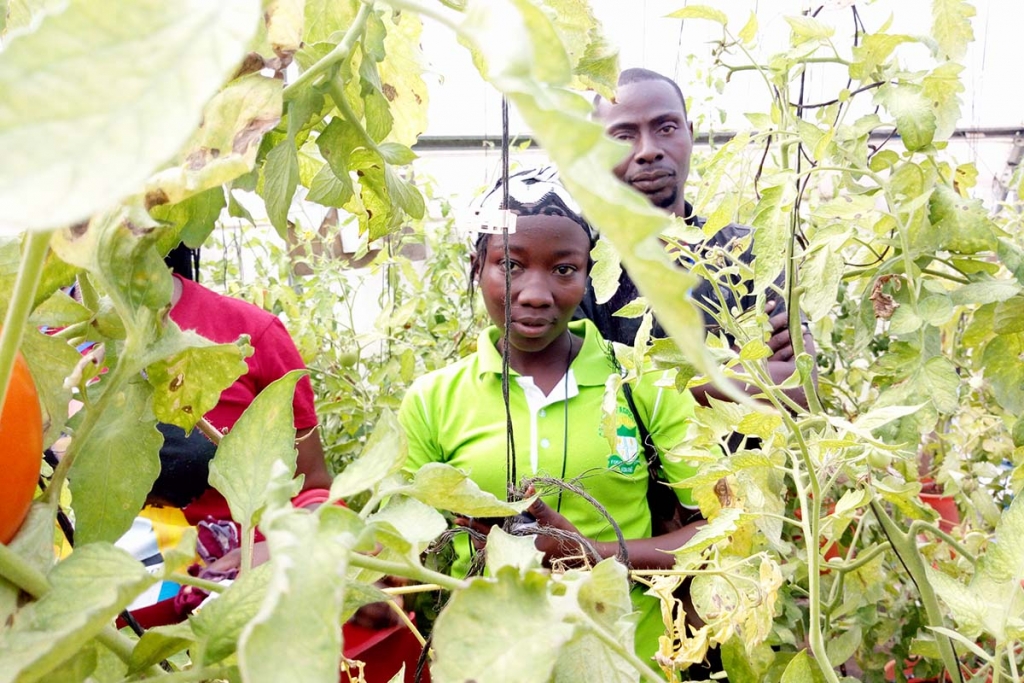
Salesian Missions highlights educational initiatives that help break the cycle of poverty to mark the International Day for the Eradication of Poverty
(MissionNewswire) Salesian Missions, the U.S. development arm of the Salesians of Don Bosco, joins humanitarian organizations and countries around the globe in honoring the International Day for the Eradication of Poverty held on Oct. 17 each year. This year also marks the 30th anniversary of the adoption of the United Nations Convention on the Rights of the Child (UNCRC) that took place on Nov. 20, 1989. UNCRC is a landmark human rights treaty that sets out the civil, political, economic, social and cultural rights of every child, regardless of race, religion or abilities.
The theme for this year’s International Day for the Eradication of Poverty is “Acting together to achieve social and environmental justice for all.” The United Nations noted, “The growing recognition of the multi-dimensionality of poverty means that these two issues are inseparably intertwined and that social justice cannot be fully realized without aggressively rectifying environmental injustices at the same time. Whereas progress has been made in addressing income poverty, there has been less success in addressing the other important dimensions of poverty, including the rapidly growing impact of the environment, within a more holistic approach.”
On May 18, Pope Francis inaugurated “Laudato Si’ Week” at the Vatican commemorating the fifth anniversary of the publication of his eco-encyclical with the same title. The week opened a wider year-long commemoration of the document aimed at spurring global citizens to adopt more sustainable practices. Through education and social development programming, including environmental projects, Salesian missionaries in more than 130 countries around the globe work to break the cycle of poverty and bring a sense of dignity to all those they serve.
Whether it’s combating child labor, assisting homeless youth or building schools where children previously had no access to education, Salesian missionaries are ensuring those in need have access to programs and services. Working in more than 5,500 Salesian educational institutions and youth centers around the globe, missionaries educate children in some of the poorest places on the planet.
“Education is a primary pathway out of poverty, and we work to ensure that all children have access to a solid educational foundation,” said Father Gus Baek, director of Salesian Missions. “Salesian educational programs provide youth the education and technical training skills they need to prepare for employment and have productive lives while becoming contributing adults in their communities. Programs also go beyond traditional education and help youth understand their relation to their community and the world around them. Environmental programs help youth give back to their communities and understand their environmental impact.”
In honor of the International Day for the Eradication of Poverty, Salesian Missions is proud to highlight initiatives that help to break the cycle of poverty for youth and their families.
ARGENTINA
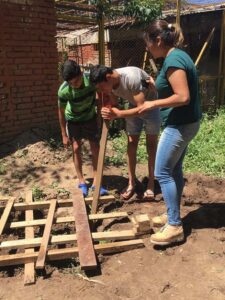
The Don Bosco Oratory in Santiago del Estero, Argentina, continues its “Young farmers, toward responsible and sustainable participation” project to provide basic training in environmental subjects.
The Don Bosco Oratory in Santiago del Estero, Argentina, continues its “Young farmers, toward responsible and sustainable participation” project, which was launched in 2018. The project provides basic training in environmental subjects and includes workshops, separate waste collection and the creation of agro-ecological gardens.
Although some workshops have been suspended during the coronavirus lockdown period, workshops have also been developed. These include courses in autochthonous forest and forest nursery, management of native forests and forests, agro-ecological gardens, and education and environmental management.
In 2019, the Don Bosco Oratory created an agro-ecological vegetable garden and a separate collection and recycling system for waste in the oratory building. Given how successful the program has been to date, staff with the oratory are working to bring project initiatives to the community.
A new project set to launch will provide a virtual environmental program to help teach families and children to create their own gardens at home. The Don Bosco Oratory is working on gathering seeds to be planted and obtaining the permits necessary to meet official regulations. Salesian staff members are also assessing local climate conditions where youth live so that their horticultural activity can be carried out with success.
GHANA
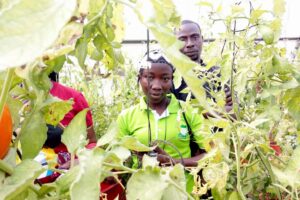
Salesian missionaries in Ghana held training to promote the green economy and sustainable agriculture.
Salesian missionaries with the Anglophone West Africa Province, in collaboration with the Don Bosco Youth Network West Africa and the Salesian International Voluntary Service for Development (VIS), promoted a week-long training on greenhouse production technologies. The goal of the training was the promotion of the green economy and sustainable agriculture.
The participants, 30 people from the Bono and Bono East regions in Ghana, were selected to attend the training with priority given to vulnerable women and older youth. These participants will take the knowledge they learned and share it with other farmers in an effort to promote youth employment and eliminate the need for migration away from their homes.
Salesian missionaries in the region also provide ongoing organic farming courses at the Salesian Agricultural School in Sunyani. To date, 93 students have been trained. Many of these students are returning migrants who have decided to stay in the country, learn a skill and trade, and contribute back to their community.
Students taking the courses have learned organic growing and how to use greenhouses, which increase the harvest since crops can be cultivated even during the dry season. The annual distribution of produce also can be better managed. Greenhouse crops are an excellent deterrent against deforestation and climate change, as they do not need much space and do not require forests to be cut down to cultivate the land.
INDIA
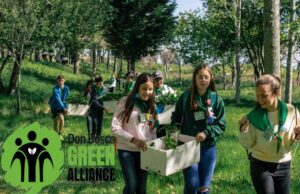
Don Bosco Green Alliance is focused on combating pollution, reducing global warming and eliminating disposable plastics.
Don Bosco Green Alliance launched a new campaign “Rethink, Reconnect, Renew” in 2020. Don Bosco Green Alliance is an international collective of youth from Salesian institutions and organizations that contribute to global environmental action, thought and policy. It was launched in April 2018 in India. In just the span of two years, Don Bosco Green Alliance has gained 273 registered members from 56 countries. Membership is open to all Salesian institutions and organizations worldwide.
All alliance members are being encouraged to make pledges on how they will concretely live more eco-friendly lives. Alliance members are also being asked to hold activities and programs during the course of the year to bring about concrete outcomes at institutional and individual levels.
Don Bosco Green Alliance is focused on combating pollution, reducing global warming and eliminating disposable plastics. In each of these areas, it aims to partner with ongoing global campaigns promoted by UN Environment or other international organizations.
Members of the alliance have also undertaken such initiatives as environmental education to increase green areas and planting trees, the reduction of the use of non-degradable materials, promotion of organic agriculture and home gardens, preservation and conservation of water, and increasing the use of renewable energy sources.
PAPUA NEW GUINEA
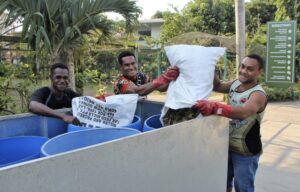
The Don Bosco Technical Institute, located in Port Moresby, Papua New Guinea, aims to be “zero waste” to conserve resources, engage in responsible production and reuse waste materials.
The Don Bosco Technical Institute, located in Port Moresby, Papua New Guinea, launched an integrated waste management plan to focus more on the environment. Trash cans were purchased so Don Bosco Technical Institute can begin separating trash collection to focus on recycling. Each week, staff members and some community residents sort the waste into the appropriate bins. The institute is also focused on how to dispose of the waste, since typically cardboard and plastic materials are thrown in the incinerator. The smoke generated can disturb the community and have a costly environmental impact.
In addition, three large compost pits were built at the back of the school, two in the Salesian residence and two more in the staff houses. The goal is to be “zero waste” to conserve resources, engage in responsible production and reuse waste materials, thereby avoiding incinerating waste or dumping it on land or in the water.
To ensure proper waste management, Don Bosco Technical Institute has organized a team made up of volunteers including eight staff members and six students. Each of them studies and works in different areas of expertise, ranging from school cleaning to collecting plastic, paper and glass. Meanwhile, efforts to recycle different types of waste are ongoing. A recycling shed has also been set up near the three compost pits. At the moment, much of the effort in waste management is conducted by students and staff, but the hope is to involve more people in the community as the initiative evolves.
###
Sources:
ANS Photos (usage permissions and guidelines must be requested from ANS)
GHANA: Salesian missionaries offered week-long training on greenhouse production technologies
GLOBAL: Don Bosco Green Alliance launches new campaign ‘Rethink, Reconnect, Renew’




